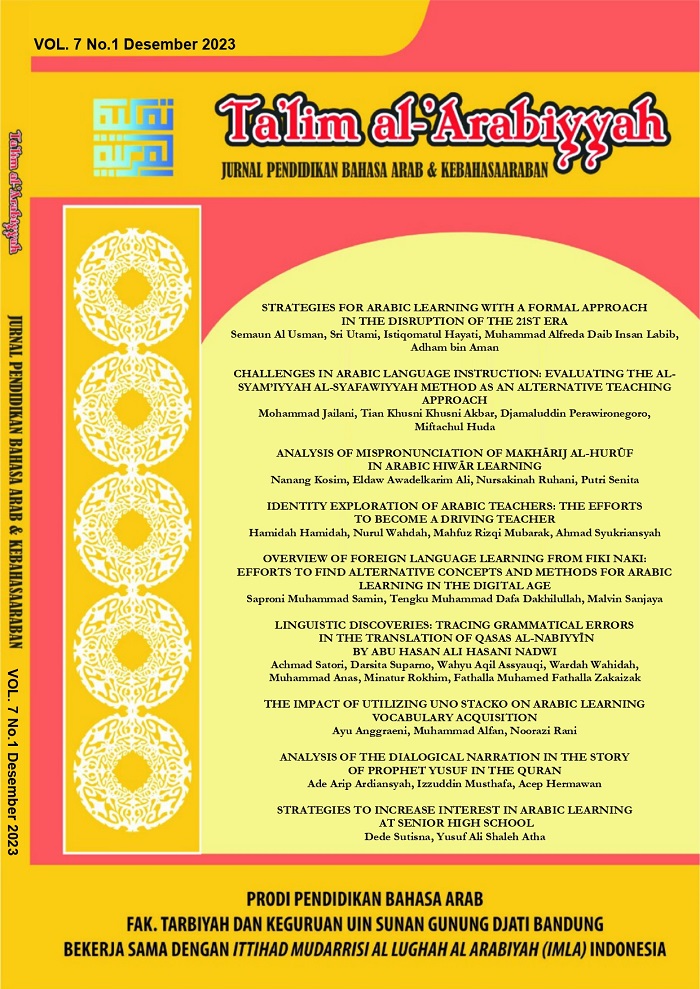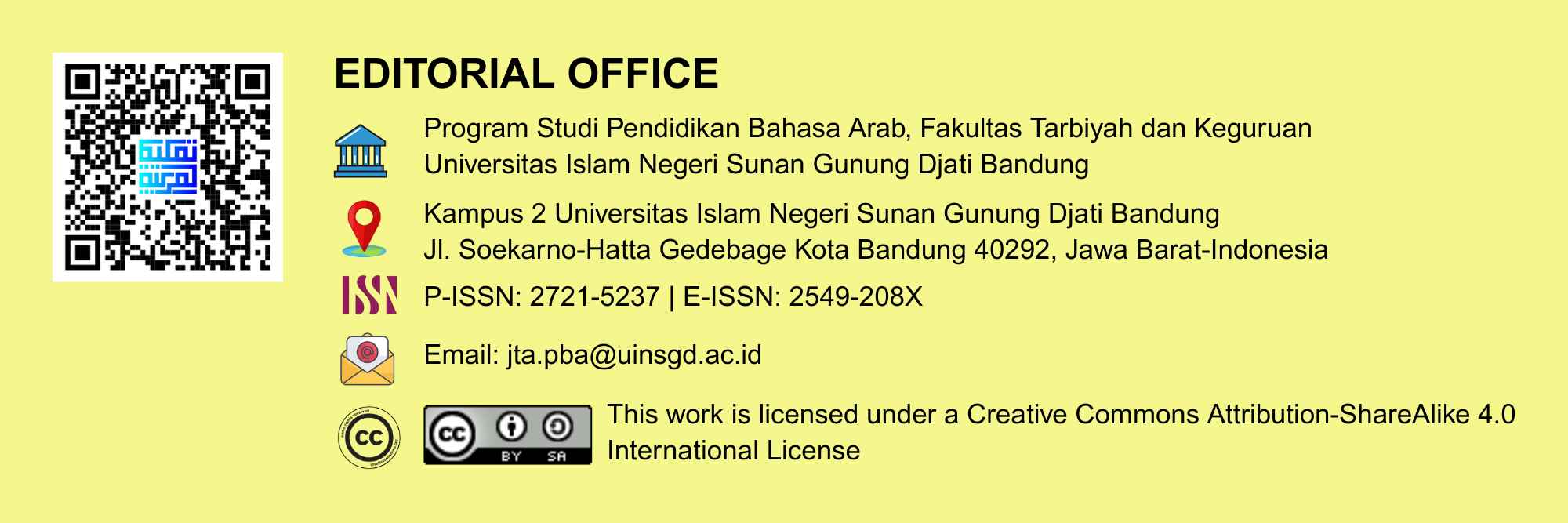Overview of Foreign Language Learning from Fiki Naki: Efforts to Find Alternative Concepts and Methods for Arabic Learning in the Digital Age
DOI:
https://doi.org/10.15575/jpba.v7i2.29455Keywords:
Arabic Learning, Digital Age, Fiki Niki, Foreign Language, Learning Concept, Learning MethodAbstract
This study aims to describe the concepts and methods of learning foreign languages from Fiki Naki (FN) in the digital age. This research is qualitative descriptive research. The data collection method used in this study is Grounded Theory. Data collection used Library research instruments or Visual Material Review. The research library used eight YouTube videos of interviews with FN and FN's answers to several questions from his fans and used other media sources. The data analysis uses four stages: Codes, Sub-Categories, Categories, and Theory. This study concludes that the FN learning model is suitable for adaptation to foreign language learning to use a foreign language in simple conversation with a native speaker of the target language, not for academic purposes. The concept of learning FN consists of two: psychological and non-psychological. Psychological learning concepts include Learning by fun, high determination and consistency, confidence in using Language, and Self-Regulated Learning. The concepts of non-psychological Learning include Autodidact, intensive Learning, direct language practice, imaginary conversation with oneself and practice it with native speakers, mastery of vocabulary and phrases with keyword strategies, and effective use of online media. At the same time, the learning method that FN uses is a communicative method with several learning techniques, including a focus on listening and speaking skills, using Mnemonic techniques in vocabulary mastery, and conjugation mastery techniques. The novelty of this research is the description of FN's foreign language learning concepts and methods in self-taught foreign language learning. The researchers recommend analyzing and implementing FN's concepts and learning methods in learning Arabic as a foreign language.
References
Abdul Ghani, M. T., Hamzah, M., Wan Daud, W. A. A., & Muhamad Romli, T. R. (2022). The Impact of Mobile Digital Game in Learning Arabic Language at Tertiary Level. Contemporary Educational Technology, 14(1), 1–18. https://doi.org/10.30935/cedtech/11480
Afif, N. (2019). Pengajaran dan Pembelajaran di Era Digital. IQ (Ilmu Al-Qur’an): Jurnal Pendidikan Islam, 2(01), 117–129. https://doi.org/10.37542/iq.v2i01.28
Akbar, A., & Irianti, E. (2023). Pengaruh Terpaan Tayangan Youtube Fiki Naki Terhadap Kemampuan Berbahasa Asing (Survey Terhadap Subscriber Fiki Naki). Jurnal Riset Komunikasi Terapan, 1(1), 32–50. Retrieved from https://jurnal.untirta.ac.id/index.php/jrkt/article/view/20038
Alharbi, N. S. (2022). The Effect of Virtual Classes on Promoting Saudi EFL Students’ Autonomous Learning. Journal of Language Teaching and Research, 13(5), 1115–1124. https://doi.org/10.17507/jltr.1305.26
Alkayisy, M. I., Muslihin, M., Rohman, A. F., & Faroh, N. (2022). Fa’Äliyyah IstikhdÄm Youtube FÄ« Ta’lÄ«m Al Lughah Al ‘Arabiyyah Li Tarqiyah MahÄrah Al KalÄm Lada Al ThullÄb Bi Al Madrasah Al TsÄnawiyyah Al IslÄmiyyah Al HukÅ«miyyah Al Ūla BÄthÄ«. Ta’lim al-’Arabiyyah: Jurnal Pendidikan Bahasa Arab & Kebahasaaraban, 6(2), 183–203. https://doi.org/10.15575/jpba.v6i2.20311
Amini, N., & Naimah, N. (2020). Faktor Hereditas Dalam Mempengaruhi Perkembangan Intelligensi Anak Usia Dini. Jurnal Buah Hati, 7(2), 108–124. https://doi.org/10.46244/buahhati.v7i2.1162
Anisa, A., Hermawan, A., Rifai, I., & Roostaei, Z. (2022). TathbÄ«q Al FÄ«diyÅ« Al Ta’lÄ«mÄ« Bi UslÅ«b SYIW (Sharing To Youtube, Instagram, And Whatsapp) Fi Ta’lÄ«m Al MufrÄdÄt Li Tarqiyah Istī’Äb Al TalÄmÄ«dz ‘Ala Ma’nÄhÄ. Ta’lim al-’Arabiyyah: Jurnal Pendidikan Bahasa Arab & Kebahasaaraban, 6(2), 255–270. https://doi.org/10.15575/jpba.v6i2.20608
Attiyat, N. M. A., Abu-Snoubar, T. K., Al-Shboul, Y., & Ismael, M. M. H. (2022). COVID-19 Outbreak, State of a Questionable Dilemma, or a Learning Escape: Second Language Acquisition Within Virtual Learning and Social Contact. Theory and Practice in Language Studies, 12(6), 1098–1106. https://doi.org/10.17507/tpls.1206.09
Azis, T. N. (2019). Strategi Pembelajaran Era Digital. The Annual Conference on Islamic Education and Social Science, 1(2), 308–318. Retrieved from https://pkm.uika-bogor.ac.id/index.php/aciedss/article/view/512
Badwi, A. (2018). Pengaruh Bakat dalam Pencapaian Prestasi Belajar. Ash-Shahabah: Jurnal Pendidikan Dan Studi Islam, 4(2), 204–208. https://doi.org/10.59638/ash.v4i2.198
Betancor Falcon, S. (2022). A Critical History of Autonomous Language Learning: Exposing the Institutional and Structural Resistance Against Methodological Innovation in Language Education. Studies in Self-Access Learning Journal, 13(3), 332–346. https://doi.org/10.37237/130303
Ceylan, N. O. (2015). Fostering Learner Autonomy. Procedia-Social and Behavioral Sciences, 199(1), 85–93. https://doi.org/10.1016/j.sbspro.2015.07.491
Elbagiz, A. A. S., & Adityo, A. (2023). Self-Concept Used by Autonomous Multilingual Learner for Improving Speaking Ability. Indonesian Values and Character Education Journal, 6(1), 24–31. https://doi.org/10.23887/ivcej.v6i1.45907
Eny, N., Sri, M. M., & Wy, D. I. (2021). Fiki Naki’s Subtitling Strategies in YouTube Channel: International Seminar on Transformative Education and Educational Leadership, 591, 605–607. https://doi.org/10.2991/assehr.k.211110.150
Golonka, E. M., Bowles, A. R., Frank, V. M., Richardson, D. L., & Freynik, S. (2014). Technologies for Foreign Language Learning: A Review of Technology Types and Their Effectiveness. Computer Assisted Language Learning, 27(1), 70–105. https://doi.org/10.1080/09588221.2012.700315
Hanafy, Muh. S. (2014). Konsep Belajar dan Pembelajaran. Lentera Pendidikan : Jurnal Ilmu Tarbiyah Dan Keguruan, 17(1), 66–79. https://doi.org/10.24252/lp.2014v17n1a5
Hermawan, A. (2018). Metodologi Pembelajaran Bahasa Arab (Edisi Revisi). Remaja Rosdakarya.
Kerras, N., & Baya Essayahi, M. L. (2022). Education and COVID-19: Learning Arabic Language and Perspectives. Electronic Journal of E-Learning, 20(1), 36–52. https://doi.org/10.34190/ejel.20.1.1976
Kissine, M., Luffin, X., Aiad, F., Bourourou, R., Deliens, G., & Gaddour, N. (2019). Noncolloquial Arabic in Tunisian Children With Autism Spectrum Disorder: A Possible Instance of Language Acquisition in a Noninteractive Context. Language Learning, 69(1), 44–70. https://doi.org/10.1111/lang.12312
Ludwig, C., & Tassinari, M. G. (2023). Foreign Language Learner Autonomy in Online Learning Environments: The Teachers’ Perspectives. Innovation in Language Learning and Teaching, 17(2), 217–234. https://doi.org/10.1080/17501229.2021.2012476
Mohamed, Y., Saad, N. M., & Sulaiman Ismail, D. M. H. (2022). Students’ Perception of Arabic Online Learning and Its Relationship in Improving Communication Skills. Journal of Positive School Psychology, 6(2), 1919–1927. https://doi.org/Retrieved from https://journalppw.com/index.php/jpsp/article/view/1759
Monika, M., & V, A. Devi. (2022). A Systematic Review on the Effectiveness of Metacognitive Strategies and Multimodal Tools in Blended Learning English Language Classroom. Theory and Practice in Language Studies, 12(11), 2239–2252. https://doi.org/10.17507/tpls.1211.03
Nguyen, C. T., Nguyen, K. T., Pham, H. N., & Le, D. T. K. (2022). Developing EFL Learners’ Autonomy in Speaking English: An Investigation Into Teachers’ Support at a University in the Mekong Delta. Journal of Language Teaching and Research, 13(5), 944–955. https://doi.org/10.17507/jltr.1305.06
Noble, H., & Mitchell, G. (2016). What is Grounded Theory? Evidence Based Nursing, 19(2), 34–35. https://doi.org/10.1136/eb-2016-102306
Ornstein, P. A., Baker-Ward, L., & Naus, M. J. (2013). The Development of Mnemonic Skill. In Memory development (pp. 31–50). Psychology Press. Retrieved from https://www.taylorfrancis.com/chapters/edit/10.4324/9780203771365-3/development-mnemonic-skill-peter-ornstein-lynne-baker-ward-mary-naus
Pinto-Llorente, A. M. (2020). A Digital Ecosystem for Teaching-Learning English in Higher Education: A Qualitative Case Study. In S. Meri Yilan & K. Koruyan (Eds.), Advances in Educational Technologies and Instructional Design (1st ed., Vol. 1, pp. 257–276). IGI Global. https://doi.org/10.4018/978-1-7998-3062-7.ch013
Pires, F., Masanet, M.-J., Tomasena, J. M., & Scolari, C. A. (2022). Learning with YouTube: Beyond Formal and Informal Through New Actors, Strategies and Affordances. Convergence: The International Journal of Research into New Media Technologies, 28(3), 838–853. https://doi.org/10.1177/13548565211020545
Prayogi, R. D., & Shobron, S. (2020). Arabic as Second Language of Educated Generation: A Theoretical Analysis at Islamic Educational Institutions in Indonesia. Ittishal Educational Research Journal, 1(1), 13–25. https://doi.org/10.51425/ierj.v1i1.2
Putnam, A. L. (2015). Mnemonics in education: Current research and applications. Translational Issues in Psychological Science, 1(2), 130–139. https://doi.org/10.1037/tps0000023
Ramalho, R., Adams, P., Huggard, P., & Hoare, K. (2015). Literature Review and Constructivist Grounded Theory Methodology. Forum Qualitative Sozialforschung / Forum: Qualitative Social Research, Vol 16(3), 1–13. https://doi.org/10.17169/FQS-16.3.2313
Razem, R. J., & Pandor, J. (2023). The Motivational Orientations of Undergraduate Students to Learn Arabic in a Dubai Private University. Journal of Language Teaching and Research, 14(1), 96–107. https://doi.org/10.17507/jltr.1401.11
Samin, S. M. (2019a). Heutagogy in Arabic Class: How It Is Applied in The Islamic Education Study Program of Universitas Islam Riau. Alsinatuna, 5(1), 20–29. https://doi.org/10.28918/alsinatuna.v5i1.2092
Samin, S. M. (2019b). Kemandirian Belajar Bagi Pembelajar Bahasa Arab Di Tingkat Perguruan Tinggi Di Era 4.0. Prosiding Pertemuan Ilmiah Internasional Bahasa Arab, XII, 613–618. https://doi.org/10.5281/ZENODO.5630269
Samin, S. M., Akzam, I., & Supriady, H. (2022). Strategies of Arabic Students’ Self-Regulated Learning Improvement in Language Proficiency in The Disruption Era. Arabiyat : Jurnal Pendidikan Bahasa Arab Dan Kebahasaaraban, 9(2), 165–177. https://doi.org/10.15408/a.v9i2.22828
Samin, S. M., & Hikmah, H. (2021). Self-Regulated Learning of Arabic Education Students via Moodle Discussion Forum. Alsinatuna, 7(1), 17–29. https://doi.org/10.28918/alsinatuna.v7i1.3751
Samin, S. M., Pebrian, R., & Zulkifli, A. (2019). Heutagogy Approaches for Arabic Learning in Higher Education in Industrial Revolution 4.0: Proceedings of the Second International Conference on Social, Economy, Education and Humanity, 454–457. https://doi.org/10.5220/0009382304540457
Samin, S. M., Yunita, Y., & Akzam, I. (2021). Strategi Peningkatan Kemandirian Belajar Mahasiswa Pendidikan Bahasa Arab di Era Revolusi Industri 4.0. Perspektif Pendidikan Dan Keguruan, 12(2), 113–120. https://doi.org/10.25299/perspektif.2021.vol12(2).7868
Samin, S. M., Zulkifli, A., & Supriady, H. (2023). Konsep Lingkungan Bahasa Arab Informal Untuk Perguruan Tinggi. Al-Hikmah: Jurnal Agama Dan Ilmu Pengetahuan, 20(1), 29–38. https://doi.org/10.25299/al-hikmah:jaip.2023.vol20(1).12026
Sari, S., Amanda, A. F., & Wulandari, Y. (2022). Literasi Digital: Dampak dan Tantangan dalam Pembelajaran Bahasa. Jurnal Tonggak Pendidikan Dasar: Jurnal Kajian Teori Dan Hasil Pendidikan Dasar, 1(2), 126–136. https://doi.org/10.22437/jtpd.v1i2.22873
Shelton-Strong, S. J. (2022). Advising in Language Learning and the Support of Learners’ Basic Psychological Needs: A Self-Determination Theory Perspective. Language Teaching Research, 26(5), 963–985. https://doi.org/10.1177/1362168820912355
Uztosun, M. S. (2021). Foreign Language Speaking Competence and Selfâ€Regulated Speaking Motivation. Foreign Language Annals, 54(2), 410–428. https://doi.org/10.1111/flan.12559
Walmsley, J. (2016). The Oxford dictionary of English grammar and the Cambridge dictionary of English grammar. In English Language and Linguistics (Vol. 20). Oxford.
Yufrizal, H. (2023). An Introduction to Second Language Acquisition. PT. RajaGrafindo Persada.
Zhang, R., & Zou, D. (2022). Self-Regulated Second Language Learning: A Review of Types and Benefits of Strategies, Modes of Teacher Support, and Pedagogical Implications. Computer Assisted Language Learning, 35(1), 1–38. https://doi.org/10.1080/09588221.2022.2055081
Downloads
Published
How to Cite
Issue
Section
Citation Check
License
Authors who publish in Ta'lim al-'Arabiyyah: Jurnal Pendidikan Bahasa Arab dan Kebahasaaraban agree to the following terms:
- Authors retain copyright and grant the journal right of first publication with the work simultaneously licensed under a Creative Commons Attribution-ShareAlike 4.0 International (CC BY-SA 4.0) License that allows others to share the work with an acknowledgment of the work's authorship and initial publication in this journal.
- Authors are able to enter into separate, additional contractual arrangements for the non-exclusive distribution of the journal's published version of the work (e.g., post it to an institutional repository or publish it in a book), with an acknowledgment of its initial publication in this journal.
- Authors are permitted and encouraged to post their work online (e.g., in institutional repositories or on their website) prior to and during the submission process, as it can lead to productive exchanges, as well as earlier and greater citation of published work (See The Effect of Open Access).
![]()
Ta'lim al-'Arabiyyah: Jurnal Pendidikan Bahasa Arab dan Kebahasaaraban is licensed under a Creative Commons Attribution-ShareAlike 4.0 International License.
Based on a work at https://journal.uinsgd.ac.id/index.php/Talim








